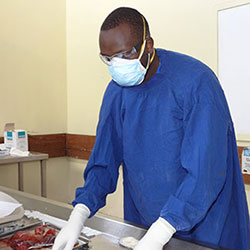Voices of MEPI Junior Faculty fellows: Dr Edwin Walong
March / April 2021 | Volume 20 Number 2

Photo courtesy of Kevin Omondi
Dr. Edwin Walong
Pathologist and lecturer
University of Nairobi, Kenya
As told to Susan Scutti
Autopsy is a platform for gaining insight and learning additional pathology - for example, a patient’s cardiovascular response to a disease or the liver’s response. We can save lives when we communicate our findings to colleagues in frontline clinical care. My fellowship project aims to identify what happens to the kidneys of children who’ve died due to pneumonia, a major cause of child death in Kenya.
The
Medical Education Partnership Initiative Junior Faculty Research Training (MEPI-Jr) program exposed me to biostatistics, epidemiological techniques and public health-based studies, which helped me identify what is of clinical, epidemiological and general scientific importance in each autopsy report I write. The main skill I acquired is communication. For example, we published a case study that prompted other practitioners to share theirs. We then amalgamated the reports to justify establishing a focus group in Kenya. That was a moment of realization that a single case report can serve as a catalyst to communicate strongly with policymakers and researchers about what more is needed to provide guidance for clinicians. The fellowship also expanded my research skills. I can now construct case-controlled studies and broad cross-sectional projects that can define populations. I learned how to acquire data and then properly clean and analyze it.
This experience helped me transition my practice from a single case-based approach to using data to identify patterns of disease. By training others to conduct time-consuming autopsies, I can scale up and spend more time on statistical research. This fellowship also broadened my network and improved my ability to interpret clinical trials and apply what I’ve learned. We may have challenges in Kenya but we also have opportunities. I intend to apply autopsy and broad mortality-based surveillance to identify areas that need improvement.
More Information
To view Adobe PDF files,
download current, free accessible plug-ins from Adobe's website.
Related Fogarty Programs
Related World Regions / Countries
Related Global Health Research Topics